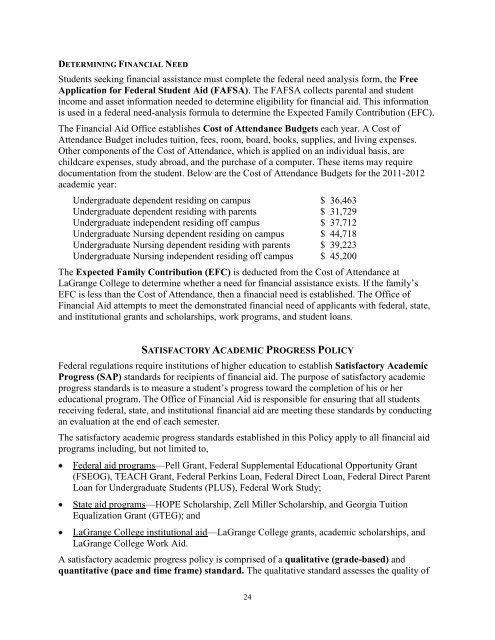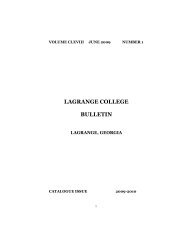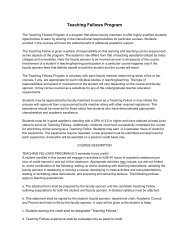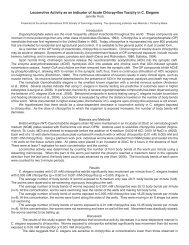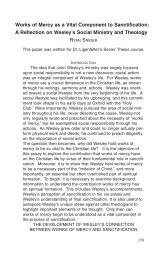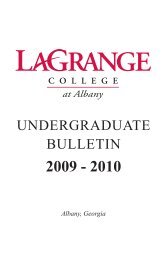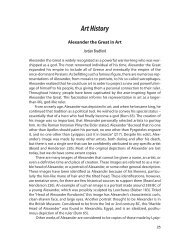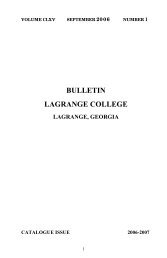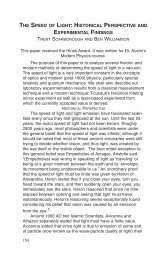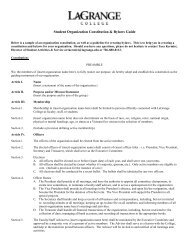undergraduate bulletin - LaGrange College
undergraduate bulletin - LaGrange College
undergraduate bulletin - LaGrange College
Create successful ePaper yourself
Turn your PDF publications into a flip-book with our unique Google optimized e-Paper software.
DETERMINING FINANCIAL NEED<br />
Students seeking financial assistance must complete the federal need analysis form, the Free<br />
Application for Federal Student Aid (FAFSA). The FAFSA collects parental and student<br />
income and asset information needed to determine eligibility for financial aid. This information<br />
is used in a federal need-analysis formula to determine the Expected Family Contribution (EFC).<br />
The Financial Aid Office establishes Cost of Attendance Budgets each year. A Cost of<br />
Attendance Budget includes tuition, fees, room, board, books, supplies, and living expenses.<br />
Other components of the Cost of Attendance, which is applied on an individual basis, are<br />
childcare expenses, study abroad, and the purchase of a computer. These items may require<br />
documentation from the student. Below are the Cost of Attendance Budgets for the 2011-2012<br />
academic year:<br />
Undergraduate dependent residing on campus $ 36,463<br />
Undergraduate dependent residing with parents $ 31,729<br />
Undergraduate independent residing off campus $ 37,712<br />
Undergraduate Nursing dependent residing on campus $ 44,718<br />
Undergraduate Nursing dependent residing with parents $ 39,223<br />
Undergraduate Nursing independent residing off campus $ 45,200<br />
The Expected Family Contribution (EFC) is deducted from the Cost of Attendance at<br />
<strong>LaGrange</strong> <strong>College</strong> to determine whether a need for financial assistance exists. If the family‘s<br />
EFC is less than the Cost of Attendance, then a financial need is established. The Office of<br />
Financial Aid attempts to meet the demonstrated financial need of applicants with federal, state,<br />
and institutional grants and scholarships, work programs, and student loans.<br />
SATISFACTORY ACADEMIC PROGRESS POLICY<br />
Federal regulations require institutions of higher education to establish Satisfactory Academic<br />
Progress (SAP) standards for recipients of financial aid. The purpose of satisfactory academic<br />
progress standards is to measure a student‘s progress toward the completion of his or her<br />
educational program. The Office of Financial Aid is responsible for ensuring that all students<br />
receiving federal, state, and institutional financial aid are meeting these standards by conducting<br />
an evaluation at the end of each semester.<br />
The satisfactory academic progress standards established in this Policy apply to all financial aid<br />
programs including, but not limited to,<br />
Federal aid programs—Pell Grant, Federal Supplemental Educational Opportunity Grant<br />
(FSEOG), TEACH Grant, Federal Perkins Loan, Federal Direct Loan, Federal Direct Parent<br />
Loan for Undergraduate Students (PLUS), Federal Work Study;<br />
State aid programs—HOPE Scholarship, Zell Miller Scholarship, and Georgia Tuition<br />
Equalization Grant (GTEG); and<br />
<strong>LaGrange</strong> <strong>College</strong> institutional aid—<strong>LaGrange</strong> <strong>College</strong> grants, academic scholarships, and<br />
<strong>LaGrange</strong> <strong>College</strong> Work Aid.<br />
A satisfactory academic progress policy is comprised of a qualitative (grade-based) and<br />
quantitative (pace and time frame) standard. The qualitative standard assesses the quality of<br />
24


